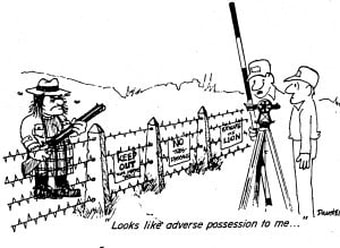|
Adverse possession is a legal rule that allows an occupier (a squatter) of land (who does not have legal title to it) to obtain ownership of it if he can prove exclusive, continuous and uninterrupted possession of the land for at least sixteen (16) years in the case of land owned by an individual or thirty (30) years in the case of land owned by the State. To establish adverse possession one must fulfill the following requirements:
1. Actual possession
There must be a sufficient amount of physical control over the property by the squatter. He must physically use the land as a property owner would. Examples include, clearing the land, planting crops, planting trees, harvesting the fruit on the land, grazing livestock, cutting timber, fencing the property, constructing a building/s, improving the building/s on the land and other improvements. Enclosure, that is, fencing of the land is strong evidence of adverse possession but it is not necessarily conclusive. Paying taxes does not establish actual possession, but may be admitted as evidence of the claim of adverse possession. The true owner’s payment of taxes does not affect the adverse possessor’s actual possession. 2. Intention to possess The adverse possessor must provide evidence that he had the “intention to possess.” He must show that he intended to take the land for himself, to use it without the legal owner’s consent, not to share it with the legal owner. This might be inferred if a person takes possession of a house and changes the locks, or if a person moves a fence, or puts a lock on a gate. If the occupier acknowledges the true owner’s title in any way this will negate any intention to possess. For example, if the possessor starts paying the true owner rent to stay on the property. 3. Continuous possession The adverse possessor must show that the property was held CONTINUOUSLY for the requisite time period, that is, at least 16 years for privately owned land and at least 30 years for state owned land. Time will continue to run in favour of the squatter unless and until he vacates the premises or acknowledges the true owner’s title. If possession is abandoned by a squatter, and there is a gap between the second squatter, the owner has possession in law during this gap and then land ceases to be in adverse possession – the limitation period (16 or 30 years) starts over from the time of the arrival of the second adverse possessor. Occasional activity on the land with long gaps of inactivity will fail the test of continuous possession. 4. Exclusive possession The adverse possessor must hold the land to the exclusion of the true owner. Anyone who enters the land with the permission of the true owner fails to have exclusive possession. 5. Open and notorious The adverse possessor’s use of the property must be so visible and apparent that it gives notice to the legal owner that someone may assert a claim. The actions must be of such character that would give notice to a reasonable person. If the legal owner has knowledge, this element is met. It can also be met by fencing, posted signs, crops, buildings, or animals that a diligent owner would be expected to know about. 6. Adverse If a person is in possession of the land with the permission of the true owner, his possession cannot be adverse; the possession must be without the permission of the true owner. If you believe you fit these requirements, it is possible that you have acquired a possessory title over property. In order to get a document evidencing this, you will need to retain an Attorney-at-Law. The attorney will take you through the legal procedures required to obtain paper title to the property. Important Notice: This post does not constitute legal advice. Always consult with an attorney on any legal problem or issue. This website is managed by AURORA Chambers; a law practice in Trinidad and Tobago. Click HERE to receive updates straight to your inbox by subscribing to our newsletter.
1 Comment
Clarke
7/1/2024 02:13:29 pm
Wasn't that law was rescinded in 2000 ?
Reply
Leave a Reply. |
Categories
All
Archives
June 2024
|
LawForAllTT.com |
|




 RSS Feed
RSS Feed